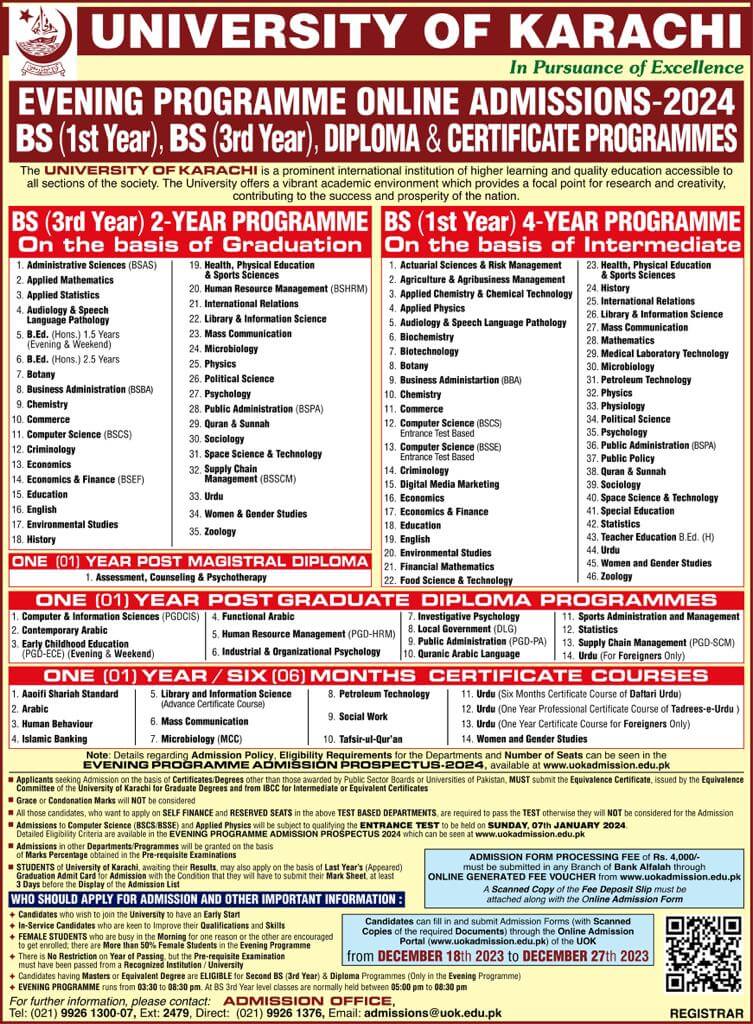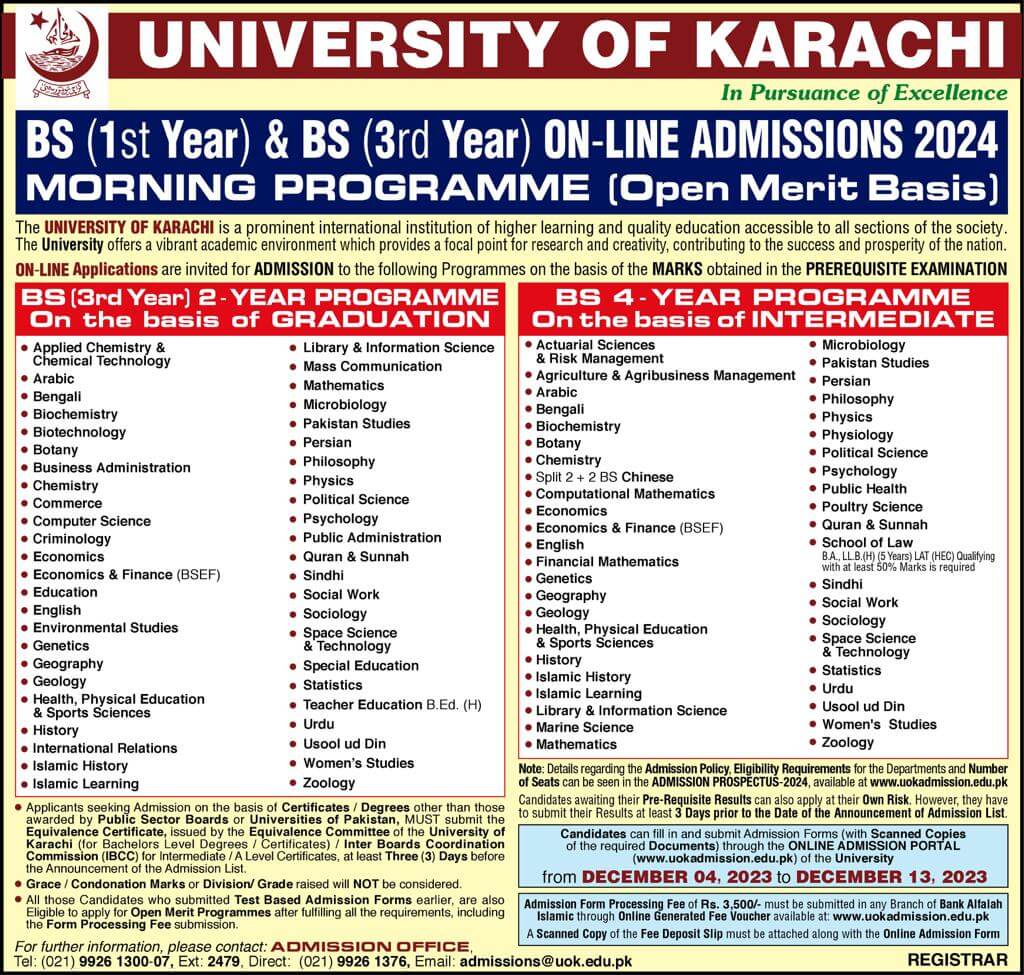Situated across 1200 acres of land, the University of Karachi had its inception as a Federal University in 1951, sanctioned by the parliament. However, a subsequent parliamentary act in 1962 redefined its status as the University of the Province of Sindh. The Karachi University Act passed on October 23, 1950, was enacted after an amendment in 1951, with Prof A. B. A Haleem assuming the role of its inaugural Vice-Chancellor.
Initially functioning solely as an examination center for affiliated colleges, the University transitioned into teaching and research in 1953, commencing operations in the Faculties of Arts and Science. Starting with an inaugural intake of 50 students, the institution has burgeoned into a sprawling establishment housing 53 Departments and 20 esteemed Research Centers and Institutes. These are organized under eight faculties: Arts, Science, Islamic Studies, Pharmacy, Management and Administrative Sciences, Law, Education, and Medicine.
As of June 30, 2018, the campus boasted an enrollment of approximately 41,000 regular students, supported by a faculty of over 700 teachers and more than 2100 staff members.
Today, the University of Karachi is the largest in the country, with affiliations to all the city’s colleges. Conducting B.S., M.S., M.Phil., and Ph.D. classes across faculties like Arts, Science, Pharmacy, Management and Administrative Science, and Islamic Learning within its campus, it administers examinations for students enrolled in Medicine, Law, and Education faculties at their respective affiliated colleges.
Under its faculties, the University offers research programs culminating in M.Phil and Ph.D. Degrees. Notably, the Science Faculty, comprising 23 departments and five research Institutes, stands as a significant scientific hub within the country. Among these Institutes, the HEJ Research Institute of Chemistry holds global recognition and the esteemed designation of the World Academy of Science. This institute serves as a leading research center in the country, specializing in chemical sciences, especially Natural Product Chemistry.
Evening Program
The University of Karachi launched its Evening program back in 1995, aiming to create educational opportunities for working individuals and professionals seeking higher education. Initially, it began with a limited number of departments offering evening courses, but over time, the program expanded, encompassing more departments providing degree courses during the evening hours.
In a recent development, the University has embraced a significant change by introducing a four-year degree program to align its education standards with global benchmarks. The revamped curricula of this program incorporate numerous new subjects, broadening the scope for graduates and enhancing their prospects within the job market. This move aims to equip students with a more diverse skill set, better preparing them for professional opportunities upon completion of their studies.

Admission Programs Test Base
The admission programs at Karachi University cater to a diverse range of prospective students seeking higher education:
- Prospective Students: Individuals aspiring to pursue higher education find opportunities within Karachi University’s admission programs.
- In-Service Candidates: Professionals seeking to enhance their qualifications and skills while continuing their employment can enroll in the University’s programs, allowing them to balance work commitments with education.
- Gender Neutrality: The admission process at Karachi University does not discriminate based on gender. No additional seats are offered or restricted based on gender, ensuring an equal opportunity for all applicants.
- Year of Passing Flexibility: Unlike the morning programs, there are no specific restrictions concerning the year of passing for candidates applying to the University’s admission programs. This flexibility allows individuals from various academic backgrounds to seek enrollment.
- Prerequisite Requirements: While there is no restriction regarding the year of passing, candidates must have passed the prerequisite examination from a recognized institution or university. This criterion ensures a standard level of academic qualification among applicants.
- Faculty of Education
- Faculty of Engineering
- Faculty of Islamic Studies
- Faculty of Management & Administration
- Faculty of Medicine
- Faculty of Pharmacy
- Faculty of Science
- Faculty of Arts and Social Science

Karachi University Open Merit Admission
The following advertisement for open merit program.

Karachi University Chines Language Admission
The following advertisement for a Chinese language program.

Karachi University Doctor Pharmacy
The following advertisement for a Doctor of Pharmacy program.

Karachi University Fee Structure
The University of Karachi has finalized its fee structure for the year 2024, as approved by the board of directors. It’s crucial to emphasize that any applications received after the specified deadline or those found incomplete will not undergo consideration for admission. Hence, it’s strongly recommended to regularly check the official website for the most recent updates regarding admissions for Bachelor’s and Master’s programs in 2024. This will ensure that applicants remain informed and can submit their applications in adherence to the outlined guidelines and timelines.
Apply Online Admission
Karachi University’s transition to exclusively accepting admissions through its online portal represents a significant stride towards modernization and efficiency in the academic realm. By embracing digital methods for admission processes, the university aims to streamline and simplify the application process for prospective students.
The move to online admissions signifies the acknowledgment of technological advancements and the growing digital landscape in education. This shift allows students to apply from anywhere with internet access, eliminating geographical barriers and making the application process more accessible and convenient for applicants from diverse backgrounds.
